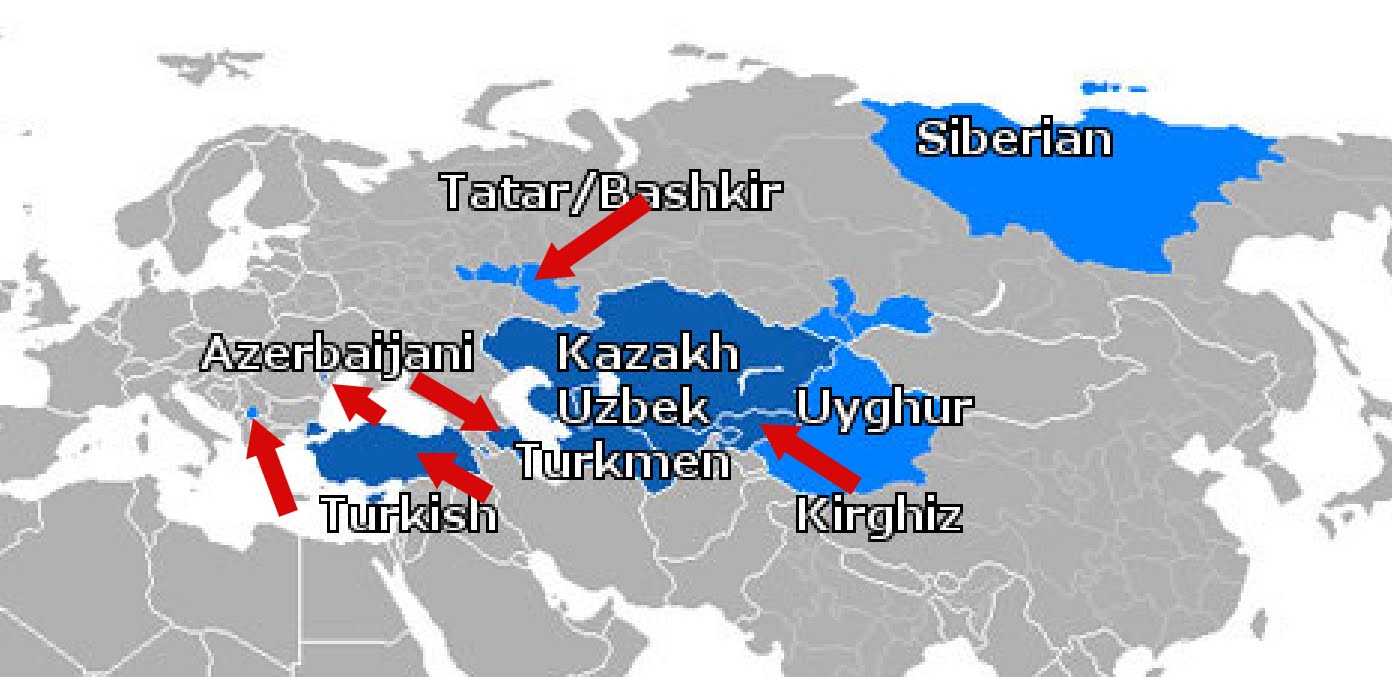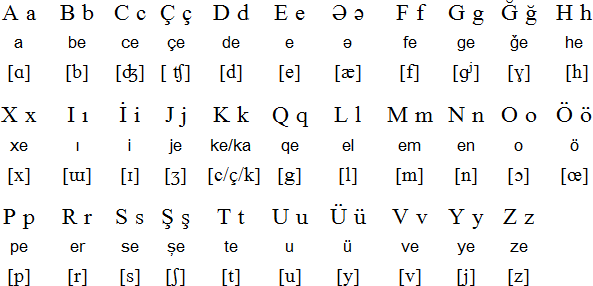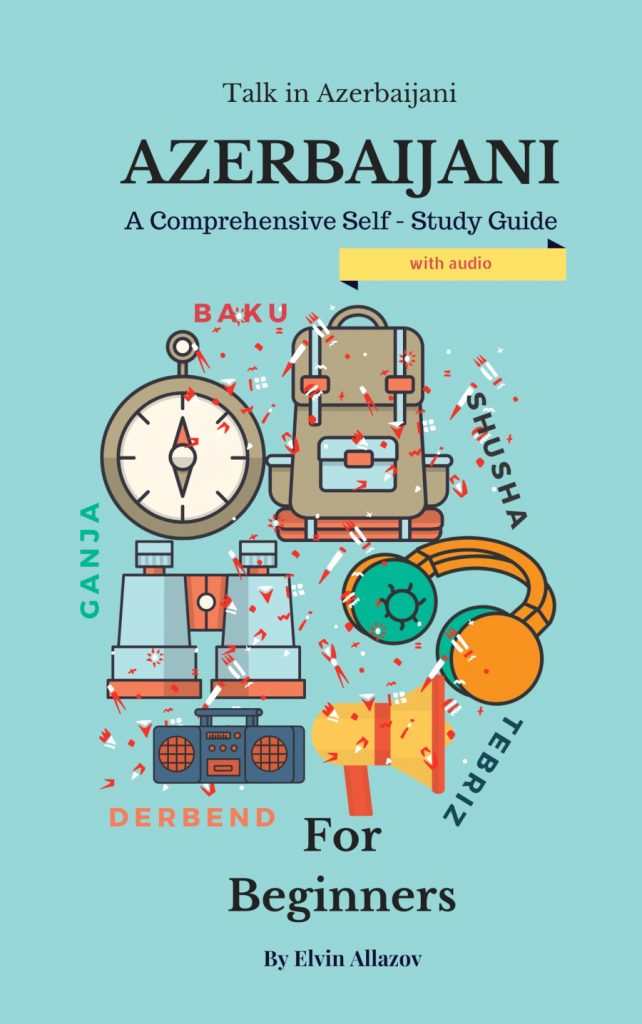Azerbaijani: The Language You Never Thought of Learning (and Why You Should)
So you’d like to speak Azerbaijani? Good call!
Never thought about studying Azerbaijani? Keep reading, because there are plenty of reasons why it’s a wonderful language to learn. In a moment, I’ll show you how to get started learning Azerbaijani.
But first…

Grab Your Suitcase — Azerbaijani Is Your Ticket into Another World
Azerbaijan is a fascinating country with its delicious cuisine, Caspian Sea shores, natural landscapes, archaeological sites and most of all, welcoming people. Not to mention that it’s the land of fire.

The Azerbaijani people will appreciate your effort to learn their language. It doesn’t matter if you are only a beginner and if your pronunciation is far from good – Azerbaijani people will appreciate the fact that you are making an effort to learn their language. You will get lots of support, help and smiles.
Your interest and knowledge show respect for the culture and people you’ve chosen to visit in your travels — and maybe you’ll even decide to settle down in Azerbaijan!
Azerbaijani is spoken primarily in Azerbaijan, the crossroads of Asia and Europe. As such, the Azerbaijani language opens doors to travelers not only to Azerbaijan, but also to northwestern Iran, where it is second most spoken language. It’s also spoken in Georgia, Russia and Turkey.
Why You Should Consider Learning Azerbaijani
As a Turkic language, Azerbaijani lays a solid foundation for learning other modern Turkic languages, like Kazakh, Kyrgyz, Uzbek and Uighur. Azerbaijani belongs to the Oghuz branch of Turkic languages, so by speaking the language you’ll already be well on your way toward understanding and reading Turkish, Tatar (Crimea) and Turkmen, the language of Turkmens living in Turkmenistan, northeastern Iran and northwestern Afghanistan.
Knowledge of Azerbaijani is an advantage when it comes to international business, and political affairs. The U.S. Department of State’s Bureau of Educational and Cultural Affairs considers Azerbaijani one of the critical languages to learn. This is due to the sheer number of Turkic languages spoken in Eurasia. To promote Azerbaijani language learning, the Bureau offers an array of scholarships and fellowships for students pursuing the language.
There are currently over 30 million speakers of Azerbaijani.

Is Learning Azerbaijani Difficult?
While Turk languages can be among the more challenging languages to learn, they also have many characteristics that make them fun and interesting, and even some aspects that make them easy.
Let’s take a look at what makes Azerbaijani an easy language to learn.
Azerbaijani Spelling and Pronunciation are Straightforward — You Say What You See
Azerbaijani is written in the Latin alphabet and (unlike English) it is pronounced as it is written, which makes it a breeze to learn pronunciation! For example, there are no silent letters like the English “-e” at the end of words.

In 1992 the Azerbaijani government officially switched from the Cyrillic to the Latin alphabet. As such, the letters are familiar and words are very easy to read for English speakers. The modern Azerbaijani alphabet contains 32 letters – 9 vowels and 23 consonants. In addition to the Latin letters you’ll recognize from English, some vowels and consonants have a diacritic mark above or below:
- Ç / ç – çe, as ‘ch’ in child, China
- Ğ / ğ – ğe, similar to a ‘g’ sound but without touching your tongue to the top of your mouth
- Ş / ş – şe, as ‘sh' in she, ship
*Ö / ö– ö, as ‘u' in turn, burn
Azerbaijani Grammar: There’s No Gender!
There is no gender in Azerbaijani, no “he”, “she” or “it”, but one word for all three: O. The der, die and das of German, or the le, la and les of French, are not found in Azerbaijani.
Overall, Azerbaijani grammar is quite simple except some nuances detailed below.
Azerbaijani Grammar: The *Agglutinative Structure *
Azerbaijani is highly agglutinating, meaning it uses a lot of suffixes instead of words to modify words. In this respect, it is similar to Korean, Japanese and Esperanto.
For example, the word otaqlarınızdan means “from your rooms” and consists of four individual parts: otaq (“room”), lar (plural), ınız (“your”) and dan (“from”).
Another example, haralısınız means “where are you from”. If you break it up, you have hara (“where”), lı (“from”), and sınız (“you”, more polite/plural).
As you see from above examples, each individual component of the word contributes to the meaning. Let’s see the process of formation the word analarımıza which means “to our mothers”:
- ana – “mother”
- analar – “mothers”
- analarımız – “our mothers”
- analarımıza – “to our mothers”
Azerbaijani Grammar: Vowel Harmony
Adding suffixes in the form of agglutination depends on the rule of vowel harmony. Vowel harmony is often seen as a difficult problem for new learners, but with a little practice, it will soon become second nature.
For example, when you are indicating specific location, you add suffixes -da, or -də:
- Berlində – “In Berlin”
- otaqda – “In the room”
- Evdə – “At home”
- divarda – “On the wall”
With verbs in the tense you add suffixes -acaq or -əcək:
- gələcək* – “he/she/it will come”
- oxuyacaq – “he/she/it will read”
- gedəcək* – “he/she/it will go”
- oturacaq – “he/she/it will sit”
Now here’s where vowel harmony comes in: Whether the suffix uses -a or -ə depends on the last vowel in the word before you add the ending:
- If the last vowel is a, ı, u, or o, then suffix will use -a
- If the last vowels is e, i, ü, or ö, then suffix will use -ə
Azerbaijani’s Missing Verb: “To Have”
Azerbaijani has no verb “to have” or “to not have”. Instead of saying “I have an object” or “I don’t have an object”, you use the phrase “my object exists” or “my object doesn’t exist.”
Azerbaijani Grammar: Sentence Structure
Like German, Japanese and Korean, Azerbaijani uses the subject-object-verb sentence structure. This means the verb most often comes last in the sentence, and generally in a phrase the most important word is the last word. Here are some examples:
- O evə gedir. – “He goes home.” (literally: “he home goes.”)
- Anna Fransız dilini öyrənir. – “Anna learns French.” (literally: “Anna French learns.”)
Case: There are six cases and they are nominative (unmarked), genitive, dative, accusative, locative and ablative:
| Case | “bird” | “home” | ||
|---|---|---|---|---|
| Nominative | quş | bird | ev | home |
| Genitive | quşun | bird’s | evin | home’s |
| Dative | quşa | to bird | evə | to home |
| Accusative | quşu | the bird | evi | the home |
| Locative | quşda | in bird | evdə | at home |
| Ablative | quşdan | from bird | evdən | from home |
The Azerbaijani Language: Cultural Influences and Loanwords
Given its geographic location and a history that includes several invasions, Azerbaijani has been influenced by Farsi, Arabic and Russian.
Let’s take a look at some sample loanwords: deputat (“parliamentarian”) comes from Russian, məktəb (“school”) comes from Arabic, and bədən (“body”) comes from Persian.
Azerbaijani: Recommended Resources and Study Materials
Want to learn Azerbaijani and aren’t sure how to start? Below are some Azerbaijani learning resources so you can get started.

Azerbaijani for Beginners: After I realised that there’s a shortage of resources for learning Azerbaijani, I decided to create this book as an introduction to the language. It includes dialogues, grammar and vocabulary, and I put it together to make the learning process smooth and simple.
Azerbaijani: A Comprehensive Course for Beginners: I created this Udemy video course for Azerbaijani beginners to go alongside my textbook. It’s best used with my textbook, but it can also be used as a standalone course.
Azerbaijani Dictionary: The only free online bilingual dictionary for English and Azerbaijani. You can find it at www.azerdict.com.



Social